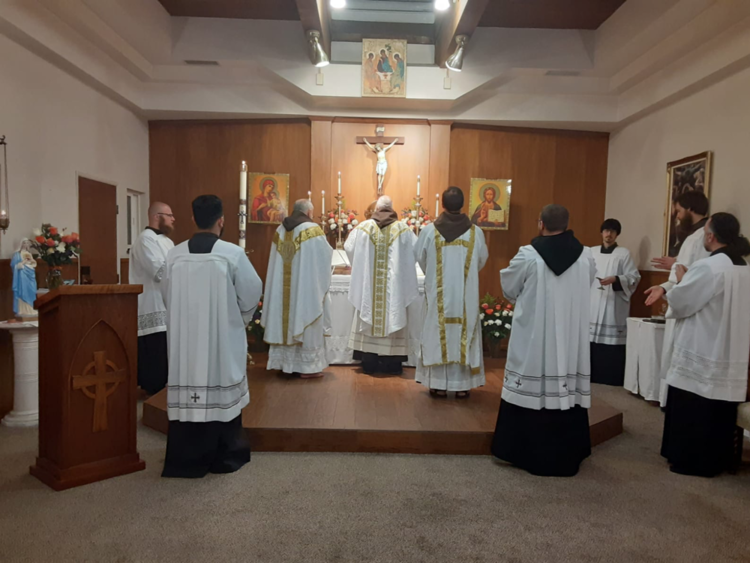THE HOLY SACRIFICE OF THE MASS
We love the Mass and believe along with Archbishop Salvatore Cordileone that “the Mass is a miracle in any form: Christ comes to us in the flesh under the appearance of Bread and Wine. Unity under Christ is what matters.”
Hence, we celebrate both forms of the Roman rite (Ordinary and Extraordinary) as well as the Byzantine Divine Liturgy, thus embracing many faithful Catholics within the Archdiocese of San Francisco.
When we come to Mass, or rather, when we come into Mass, we sit, stand, kneel at the foot of the Cross. Moreover, as the Second Vatican Council states, “in the earthly liturgy we take part in a foretaste of that heavenly liturgy” where we join with all the angels and saints in praising the Triune God, Father, Son, and Holy Spirit.
From all of this, we see how the Holy Mass is at the same time the Sacrifice of the Cross and the threshold of the Heavenly Kingdom, the heavenly liturgy, where the choirs of angels ceaselessly sing Holy, Holy, Holy, Lord God of hosts…

Divine Liturgy
Inspired by Pope St. John Paul II’s Apostolic Letter Orientale Lumen, we celebrate the Byzantine Divine Liturgy, and together with this saintly pope we believe that “the venerable and ancient tradition of the Eastern Churches is an integral part of the heritage of Christ's Church” (Orientale Lumen). In this way, we breathe with both lungs of the Church, and pray for the unity of all the churches so “that they may all be one” (John 17:21).
Divine Office
The Church, by celebrating the Eucharist and by other means, especially the celebration of the Divine Office, is ceaselessly engaged in praising the Lord and interceding for the salvation of the entire world.” (Sacrosanctum Concilium, Chapter IV, The Divine Office, 83.)
When a community prays the Divine Office together, “it is truly the voice of the bride addressed to her bridegroom; it is the very prayer which Christ Himself, together with His body, addresses to the Father.” (The Divine Office, 84.) Understanding this, we come to our chapel with the attitude of gratitude, because we are made worthy to be the voice of the bride, praising her Bridegroom, Christ our Lord.
We pray the Office of Readings on our own, while the rest of the hours are in common, with Gregorian chant in Latin.
Contemplative Prayer
Let us be present to the Presence.
We can truly be with the LORD “face to Face,” most especially in the Holy Eucharist, where we worship Him on a daily basis in Adoration, but also on 24-hour Adoration days, where we have the opportunity to be awakened to the Indwelling Trinity, everywhere present and filling all things.
"By adoring Jesus’ Eucharistic Body, we, the Contemplatives of Saint Joseph, imitate this great saint, who was worthy to hold the Child Jesus in his arms and be the protector of His Sacred Body.”
Desert Day
The Desert Day is a crucial time for us personally but also communally, where we go apart to be alone with the Father, following the example of our Lord Jesus Himself, who would often “withdraw to deserted places and pray” (Luke 5:16). These days can either be spent in one’s cell, the chapel, or nature, remaining in silence to hear the voice of God Who speaks in silence.
Only through prayer can we truly give of ourselves in the active apostolate. As Pope Benedict XVI states, “spending time in God’s presence in prayer is a real pastoral priority; it is not an addition to pastoral work: being before the Lord is a pastoral priority and, in the final analysis, the most important.”
Personal Devotions
OUR LADY
The relationship with Our Lord Jesus can be truly fully realized through our relationship with His, and our, Mother. We foster a deep love for Our Lady, such as during the Holy Mass; when celebrating one of her many feasts; or by praying the Holy Rosary, one of the litanies, or other Marian devotions.
She is the one who always points to Jesus and says, “Do whatever He tells you” (John 2:5).
ST. JOSEPH
“Ite ad Joseph!”
We pray special prayers to St. Joseph on Wednesdays and keep various private devotions to him, as he is our inspiration for a life of silence and deep contemplation of the Divine Mysteries.
OTHER DEVOTIONS
The Chaplet of Divine Mercy, the Chaplet of St. Michael, and other personal devotions are supported by the community for the members to pray. Nevertheless, all of these should be prayed as a means of entering into a profound communion with the LORD, especially once we discover the Sacred Silence.
Retreats
Several times a year, the COSJ invites certain individuals to come to the monastery and give the monks and sisters a retreat. These in-house retreats usually last one week and are meant to strengthen the spiritual lives of the COSJ members.
Once a year, the COSJ priests, brothers, and sisters go on an extended retreat to another religious community, whether in the Western or Eastern Catholic tradition, so that they are exposed to different ways of living out a religious vocation and are able to take a break from their usual work duties.
“The Contemplative Life is a Vocation.”
